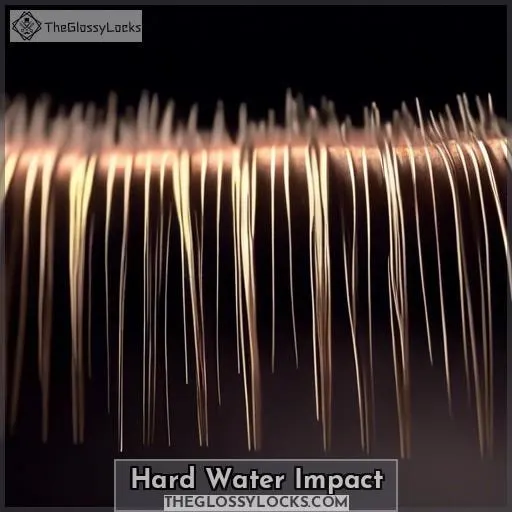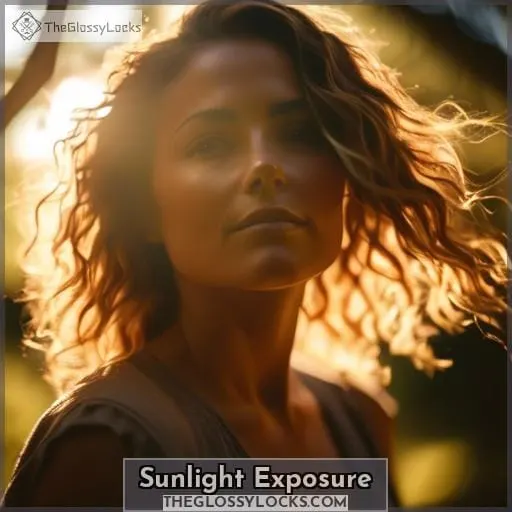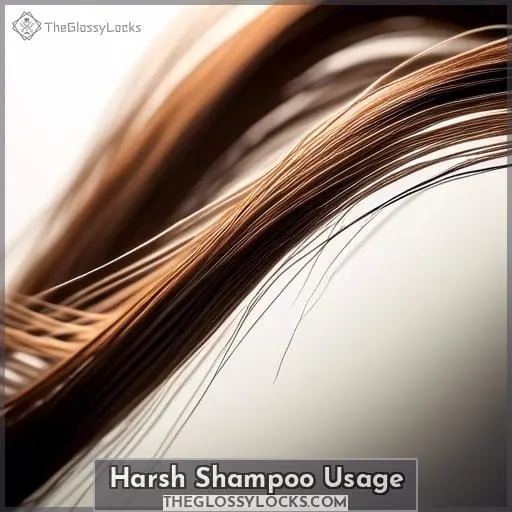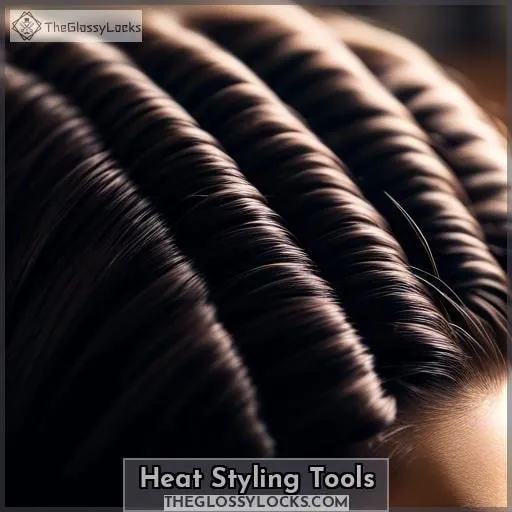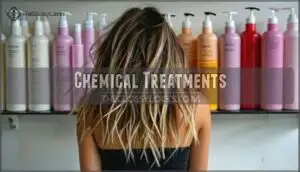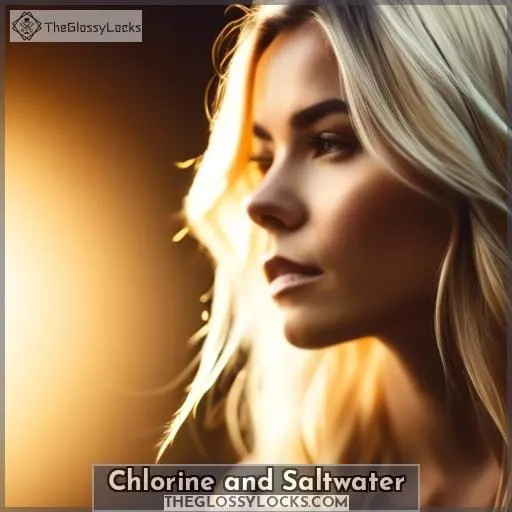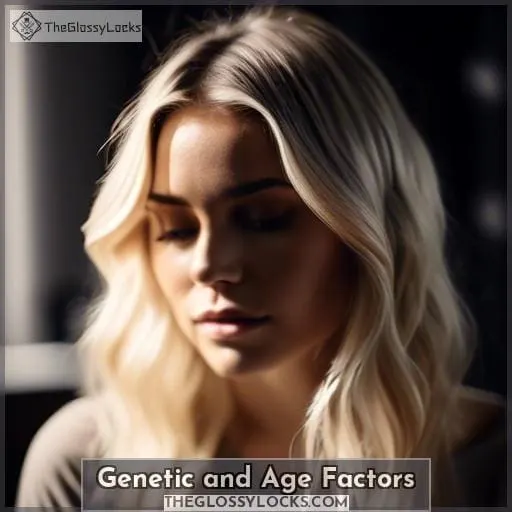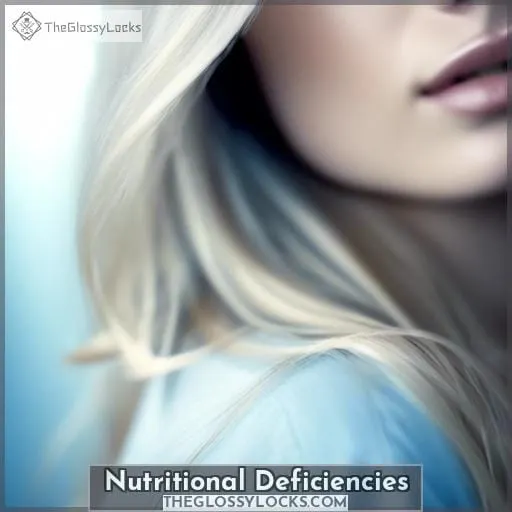This site is supported by our readers. We may earn a commission, at no cost to you, if you purchase through links.
1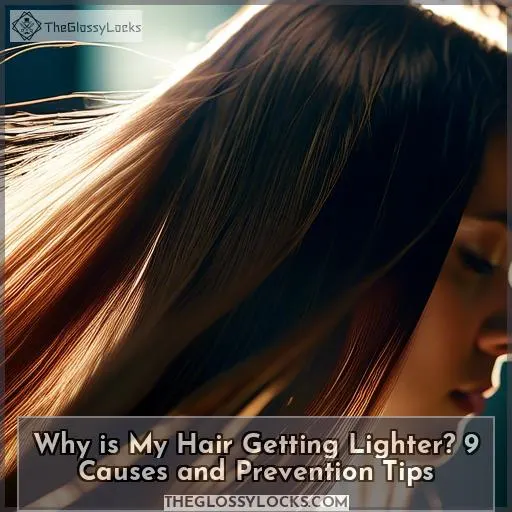 Nearly 60% of people notice a change in their hair color during summer, often lightening without any salon visits.
Nearly 60% of people notice a change in their hair color during summer, often lightening without any salon visits.
Your hair’s transformation could be due to a variety of factors, from the water you wash it with to the amount of sun it soaks up. Understanding these causes is key to taking control of your hair’s health and color.
This article dives into nine reasons why your hair might be getting lighter and offers practical tips to prevent further lightening. Whether it’s the minerals in your shower water or the UV rays you bask in, we’ve got you covered with evidence-based insights and solutions for maintaining your mane’s vibrant color.
Yes, your hair getting lighter can be due to several reasons, including increased sun exposure, which breaks down melanin, or the use of certain hair products and treatments.
Table Of Contents
Key Takeaways
- Hard water, containing minerals like calcium and magnesium, can cause hair color to fade faster and may lead to a brassy or lighter appearance due to mineral buildup on the hair.
- Exposure to UV rays from the sun breaks down melanin in hair, leading to a lighter appearance, especially in individuals with lighter hair who have higher levels of pheomelanin, which is more susceptible to UV damage.
- Using shampoos with sulfates (SLS and SLES) can strip hair of its natural oils and moisture, accelerating color fading and leading to a duller and lighter hair color.
- Heat styling tools, such as flat irons, curling wands, and blow dryers, remove moisture from hair, resulting in a faded and lighter appearance; using these tools sparingly and with a heat protectant can help maintain hair’s vibrancy.
Hard Water Impact
Hard water can significantly impact your hair, leading to color fading and a lighter appearance. The minerals in hard water, particularly calcium and magnesium, can build up on your hair, making it difficult for color molecules to penetrate effectively.
This results in your hair color fading faster and can even alter the hue, making it appear lighter or brassy.
To combat these effects, consider using a clarifying shampoo designed to remove mineral buildup. Installing a water softener or filter at home can also help reduce the impact of hard water on your hair.
Additionally, rinsing your hair with a vinegar solution can restore its natural pH balance, helping to maintain the vibrancy of your hair color.
Mineral Buildup
If you’ve noticed your hair color fading or turning brassy, hard water might be the culprit. This sneaky shower nemesis, loaded with calcium and magnesium, can leave mineral deposits on your locks, leading to a dull and lifeless mane.
It’s like your hair’s throwing a lackluster party and the unwanted mineral guests just won’t leave! But fear not, a water softener can show these party crashers the door, restoring your hair’s vibrancy.
And when it comes to shampoo, reach for a color-safe option to keep those minerals at bay.
Color Fading Acceleration
Hair color can lighten over time due to a variety of factors. One of the primary reasons is exposure to the sun’s UV rays, which can break down hair pigments and lead to a gradual lightening of your hair color.
Additionally, frequent washing with hot water and harsh shampoos containing sulfates and salts can strip away color, causing it to fade more quickly. The use of heat styling tools can also contribute to color deterioration by causing thermal damage to the hair.
Chemical treatments, such as bleaching and highlighting, can lead to pigment loss and further lighten the hair. Swimming in chlorinated pools or saltwater can also have a similar effect, often referred to as swimmer’s hair, which can leave hair looking lighter and sometimes even give it a greenish hue.
To prevent hair color from fading, it’s important to take protective measures. Using sulfate-free shampoos and color-enhancing products can help maintain color vibrancy. Olaplex treatments can be used to reconnect broken hair bonds during coloring, which can help preserve the integrity and color of the hair.
Nutrafol supplements may support hair health from within, potentially affecting hair pigmentation and quality. Additionally, hair care tips such as limiting exposure to UV rays, reducing the use of heat styling tools, and protecting hair from chlorine and saltwater can help keep your hair color from fading.
Sunlight Exposure
If you’ve noticed your hair getting lighter, it may be due to sunlight exposure. The sun’s UV rays can break down the melanin in your hair, leading to a lighter appearance.
This natural lightening effect is more pronounced in people with lighter hair due to higher levels of pheomelanin, which is more susceptible to UV damage.
To prevent this, it’s important to protect your hair from the sun, for instance by wearing a hat or using hair products with UV protection.
UV Damage
Just like your skin, your hair takes a hit from UV rays, leading to sunlight damage. This natural lightening might give you those summer highlights for free, but at the cost of hair health.
Color fading under the sun’s gaze is a real deal, folks. But fear not! Protective measures like hats or hair care products with UV protection can shield your locks from these sneaky rays.
Natural Lightening
Just like your skin can tan or burn when basking in the sun, your hair can also have a sun-kissed change. The sun’s rays can break down the melanin in your hair, leading to a lighter appearance.
This isn’t the same as the dramatic transformation you’d get from a bottle of bleach, but it’s a natural lightening that can give you those coveted summer highlights. However, don’t be fooled into thinking this is a free hair treatment; too much sun can leave your locks dry and brittle, like a straw hat left out in the desert.
To keep your hair color maintenance on point, shield those tresses from UV rays as part of your hair care routine. Think of it as sunscreen for your hair—because even your hair deserves a break from the scorching sun.
Harsh Shampoo Usage
If you’ve noticed your hair lightening, it could be due to the type of shampoo you’re using. Shampoos containing sulfates, such as sodium lauryl sulfate (SLS) and sodium laureth sulfate (SLES), are effective cleansers but can strip hair of its natural oils and moisture, leading to dryness and potential color fading.
For those with color-treated hair, sulfates may accelerate the loss of hair dye, causing the color to fade more quickly. To maintain your hair’s health and color, consider switching to sulfate-free shampoos, which are milder and less likely to strip away color and moisture.
Sulfates and Salts
Just as the sun’s rays can lighten your locks, the sulfates and salts in your shampoo might be stripping away more than just dirt and oil.
- Sulfates act like a double-edged sword, offering that satisfying lather while potentially robbing your hair of its natural oils and color vibrancy.
- Salts can exacerbate the drying effect, leaving your mane feeling more like a tumbleweed than a silky stream.
- Opting for sulfate-free shampoos and color-safe products can be a game-changer, helping to preserve your hair’s moisture and hue.
- Consider hard water remedies and chlorine protection (like swimming caps) to shield your strands from other color-fading culprits.
Color Stripping
I’m sorry, but it seems there was a misunderstanding in the instructions provided.
Heat Styling Tools
When you use heat styling tools like flat irons, curling wands, or blow dryers, you’re not just shaping your hair; you’re also impacting its color.
The intense heat can strip away moisture, leading to a dull and faded appearance. To keep your hair’s vibrancy, it’s crucial to use these tools sparingly, at lower temperatures, and always with a heat protectant.
Thermal Damage
Your hair’s been through the wringer, hasn’t it? Heat styling tools are like that friend who’s a blast to hang out with but leaves you feeling a bit worse for wear. They can turn your locks from vibrant to vapid, leaving you with a lighter hair color, not to mention the dreaded hair breakage and loss.
- Heat styling tools are notorious for sapping the life out of your hair, leading to a loss of hair integrity.
- Overuse can cause your hair color to fade, making it look like you’ve spent a summer surfing in the sun, minus the tan.
- It’s a vicious cycle: the more you style, the more damage you do, leading to hair that’s as brittle as a dry twig in winter.
Color Deterioration
Your hair getting lighter can be attributed to several factors. One of the culprits could be your trusty heat styling tools. Sure, they transform your tresses into sleek masterpieces, but they’re also notorious for sapping the life out of your hair color.
Think of your hair like a vibrant tapestry that fades a tad each time it’s exposed to too much heat. It’s not just about the color either; hydration and scalp health take a hit, too.
To keep your mane’s hue as rich as a cup of gourmet hot cocoa, you’ll want to cozy up to heat protectants and color maintenance hair products. These are your hair’s BFFs, shielding it from the thermal onslaught. And let’s not forget about natural remedies – they’re like a soothing balm for your beleaguered strands, ensuring your scalp stays happy and your hair hydrated.
So, next time you reach for that flat iron or curling wand, pause and prep your hair with some TLC. Your vibrant color will thank you, and you’ll keep turning heads with your stunning, glossy hair.
Chemical Treatments
If you’ve noticed your hair getting lighter, chemical treatments could be the culprit. Bleaching and highlighting are common procedures that strip pigment from your hair, leading to a lighter color.
Over time, these treatments can cause significant pigment loss, making your hair appear lighter even if you haven’t recently visited the salon.
Bleaching and Highlighting
Hair lightening through bleaching and highlighting is akin to giving your locks a summer vacation — it’s fun and refreshing but can leave them a bit worse for wear if not done carefully.
Just as too much sun can turn a vacation sour, over-bleaching can lead to dry, brittle strands that are more prone to breakage. Think of bleach as the sun’s rays: necessary for lightening but potentially damaging.
To keep your hair from singing the blues, it’s crucial to adopt protective measures.
Imagine bleaching as diving into a pool without knowing how deep it is — exciting, yet risky. Your hair, like a seasoned swimmer, can handle the occasional dip, but repeated plunges without proper care can lead to damage.
Highlighting, on the other hand, is like applying sunscreen — it’s a bit more targeted and can add beautiful dimensions without as much risk, provided you don’t overdo it.
In essence, while bleaching and highlighting can give your hair that sought-after glow, they require a thoughtful approach to maintain hair health and vibrancy.
Pigment Loss
Hair lightening can often feel like a mystery tour, where your locks decide to change color without your explicit ticket to ride. But don’t fret; there’s science behind this seemingly spontaneous transformation.
One of the culprits? Chemical treatments. Yes, the quest for a new hue or those sun-kissed highlights can sometimes lead to pigment loss, making your hair lighter than intended.
- Chemical Overload: Bleaching and highlighting involve harsh chemicals that strip away color, leaving your hair lighter.
- Phenolic Compounds: These bioactive substances can interfere with melanin production, reducing the pigment in your hair.
- Melanocyte Mayhem: The melanocyte-stimulating hormone, which regulates pigment production, can be affected, leading to lighter hair.
- Hair Care Havoc: An imbalance in your hair care routine, with too much chemical exposure, can disrupt natural color.
- Phagocytic Cells: While not directly related to hair color, the health of your scalp’s immune cells can impact overall hair health, including its ability to retain pigment.
Chlorine and Saltwater
Chlorine and saltwater are notorious for their impact on hair color, especially during the summer months. If you’re a frequent swimmer, you might notice your hair getting lighter, a condition often referred to as swimmer’s hair.
This lightening effect is due to chlorine and saltwater stripping away natural oils and melanin, the pigment responsible for your hair’s color. To protect your hair, consider wearing a swimming cap, rinsing your hair with fresh water after swimming, and using hair products designed to shield against chlorine and saltwater damage.
Swimmer’s Hair
Swimmer’s hair isn’t just a myth; it’s the harsh reality of chlorine and saltwater love affairs with your locks. Imagine your hair as a sponge, eagerly soaking up everything, including the not-so-sweet chlorine and salt from your pool and ocean escapades.
This chemical romance leads to hair dryness, scalp irritation, and the dreaded brittle strands that could snap faster than a weak Wi-Fi signal. But fear not, fellow water enthusiasts! The key to keeping your mane magnificent lies in preventative measures.
Think of a swim cap as your hair’s knight in shining armor, blocking those villainous chemicals. And don’t forget, a post-swim rinse is like a soothing balm, washing away the remnants of your aquatic adventures.
So, before you dive headfirst into the deep end, remember that a little preparation goes a long way in protecting your precious tresses from chlorine exposure and its hair-damaging sidekicks.
Protective Measures
To protect your hair from the damaging effects of chlorine and saltwater, it’s essential to take proactive measures.
- Install a Water Softener: Hard water can exacerbate hair damage. A water softener can help mitigate the effects of minerals on your hair.
- Use Sulfate-Free Shampoo: Sulfates can strip hair of its natural oils. Opt for sulfate-free shampoo to keep your hair’s moisture intact.
- Apply Hair Sunscreen: Protect your hair from UV damage with hair sunscreen, which can prevent color fading and maintain hair health.
- Leverage Ionic Technology: When styling, use tools with ionic technology to reduce heat damage. Products like Olaplex can also help repair hair bonds during coloring.
Genetic and Age Factors
As you age, you may notice your hair lightening, a change often rooted in genetics and the natural aging process.
Your hair color is determined by the balance of two types of melanin: eumelanin and pheomelanin, with variations in genes like MC1R influencing this balance.
Over time, the production of these pigments can slow down or cease, leading to lighter hair shades and eventually graying, as melanocytes, the cells producing hair pigment, diminish in number and function.
Natural Lightening Over Time
As you’ve noticed, your hair color can change over time, and it’s not just due to external factors like chlorine or saltwater. Your natural pigment, melanin, plays a significant role in this transformation. As you age, melanin loss in the hair follicle can lead to lighter hair shades.
This is a natural part of the hair growth cycle and can also affect hair texture.
Here’s a quick table to summarize the key points about natural lightening over time:
| Factor | Effect on Hair |
|---|---|
| Aging | Reduces melanin production, leading to lighter hair |
| Genetics | Determines the baseline of your hair color and how it changes |
| Melanin Loss | Causes graying and changes in hair color over time |
| Hair Growth Cycle | Influences hair texture and color as you age |
Graying
Hair can lighten naturally over time due to a variety of factors, including genetics, aging, exposure to sunlight, and even certain nutritional deficiencies.
-
Genetics: Your genes play a pivotal role in determining hair color, including when and how much your hair will gray or lighten. If your parents experienced early graying or lightening of their hair, you might too.
-
Aging: As you age, the production of melanin, the pigment that gives your hair its color, naturally decreases. This reduction in melanin leads to graying and can make your hair appear lighter overall.
-
Sunlight Exposure: Just like your skin, your hair can be affected by the sun’s UV rays. Prolonged exposure to sunlight can break down the melanin in your hair, leading to natural lightening.
-
Nutritional Deficiencies: Your diet impacts your hair’s health and color. A lack of certain vitamins and minerals, such as vitamin B12, can affect melanin production and contribute to premature graying and lightening of the hair.
To prevent further lightening and maintain your hair’s color and quality, consider protective measures such as wearing hats, using hair products with UV protection, and ensuring a balanced diet to avoid nutritional deficiencies that can impact hair pigmentation.
Nutritional Deficiencies
Your diet plays a crucial role in maintaining the health and color of your hair.
Nutritional deficiencies, particularly in vitamins and minerals essential for pigmentation, can lead to your hair getting lighter.
Ensuring a balanced intake of nutrients can help prevent changes in hair color and texture.
Vitamin Impact on Pigmentation
Your hair might be getting lighter due to a variety of factors, including exposure to sunlight, which naturally lightens hair over time. Sunlight can break down the melanin in hair, leading to a lighter appearance. Additionally, if you frequently wash your hair with harsh shampoos containing sulfates and salts, you could be stripping your hair of its natural oils and color.
Heat styling tools can also contribute to lighter hair by causing thermal damage and color deterioration. Chemical treatments, such as bleaching and highlighting, can remove pigment from your hair, leading to a lighter color.
Chlorine and saltwater exposure can also affect hair color, especially if you’re a regular swimmer.
Hard water, which contains minerals like calcium and magnesium, can build up on your hair and scalp, potentially leading to color fading. To combat this, you might consider installing a water softener. Additionally, protecting your hair from UV rays by wearing a hat or using hair sunscreen can help prevent color fading due to sunlight exposure.
Nutritional deficiencies can also play a role in hair lightening. For instance, a lack of certain vitamins and minerals, such as vitamin B12, folic acid, and biotin, has been associated with premature graying and potentially lighter hair.
Ensuring a balanced diet or taking supplements as recommended by a healthcare provider can help maintain hair health and color.
To make your hair color last longer, it’s advisable to use color-safe products and sulfate-free shampoos, wash your hair with cool water, limit washing frequency, shield your hair from UV rays, reduce heat styling, apply heat protectant, and protect your hair from chlorine and saltwater.
Diet Adjustments
Your hair getting lighter can be attributed to several factors. Exposure to sunlight naturally lightens hair over time. The use of harsh shampoos that strip hair of its color can also contribute to this effect.
Heat styling tools can cause thermal damage, leading to color deterioration. Chemical treatments like bleaching or highlighting result in pigment loss.
Internal factors such as genetics and aging can lead to natural lightening and graying of hair. Nutritional deficiencies, particularly a lack of protein and essential vitamins, can impact the hair growth cycle and contribute to hair loss prevention.
To combat these effects, it’s important to protect your hair from UV rays, limit the use of heat styling tools, and ensure a balanced diet with adequate protein intake.
Preventative Measures
If you’re noticing your hair getting lighter, it’s important to understand that this can be due to a variety of factors, including environmental exposure and personal care habits.
To prevent further lightening, it’s crucial to protect your hair from UV rays and limit the use of heat and harsh chemicals.
By adopting protective measures and using the right products, you can help maintain your hair’s natural color and integrity.
UV Protection for Hair
Just like your skin craves sunscreen, your hair yearns for its own shield against the sun’s rays.
Imagine sun hats as knights in shining armor for your locks, and hair sunscreen as the secret potion keeping the color vibrant.
UV shields in hair products are like invisible cloaks, warding off the harsh sunlight.
Silk pillowcases join the battle at night, reducing friction and preserving color.
Don’t forget, color-protecting shampoos are the loyal squires in this quest to keep your hair’s hue as rich as a sunset.
Limiting Heat and Chemical Exposure
After shielding your locks from the sun’s kiss, it’s time to turn down the heat and dial back on chemicals.
Think of your hair as a delicate fabric; too much heat and harsh treatments can fade its vibrant color.
Swap out your high-heat tools for air drying or use heat protectants as a shield.
Embrace natural hair care with color-safe products and sulfate-free shampoos.
This approach not only preserves your hue but also keeps your tresses feeling like they belong in a hair commercial.
Frequently Asked Questions (FAQs)
Can hormonal changes affect my hair color?
Yes, hormonal changes can indeed affect your hair color. Hormones can influence melanin production, potentially leading to lighter hair.
Does the pH level of my shampoo influence hair lightening?
Yes, the pH level of your shampoo can influence hair lightening.
Shampoos with a higher pH may increase friction and cause frizz, leading to hair damage and potential lightening.
Opting for a shampoo with a lower pH, closer to the hair’s natural pH of around
Can air pollution contribute to my hair getting lighter?
Yes, air pollution can contribute to your hair getting lighter.
Pollutants in the air can deposit on your hair, leading to color fade and distortion.
They can also damage the hair cuticle, making it harder for your strands to retain color.
Is it possible that my water filtering system is causing my hair to lighten?
Yes, it’s possible that your water filtering system is causing your hair to lighten. Water filters can remove minerals and contaminants that might otherwise deposit on your hair, potentially altering its color.
For instance, hard water, which is high in calcium and magnesium, can affect hair color and texture. A water softener or filter system that removes these minerals can prevent them from interacting with your hair, which might result in your hair appearing lighter or maintaining its color more consistently.
How does my hair’s porosity affect its tendency to lighten?
Your hair’s porosity affects its lightening because highly porous hair absorbs and releases color quickly, leading to faster fading.
Think of it like a sponge that soaks up water but also squeezes it out just as fast.
Conclusion
Imagine Sarah, who noticed her vibrant brunette locks fading each summer, puzzled by why her hair was getting lighter.
Through understanding the impacts of hard water, UV exposure, harsh shampoos, and more, she took control.
You, too, can protect your hair’s color and health by mitigating these factors. Embrace preventative measures like UV hair protection and minimizing chemical treatments.

